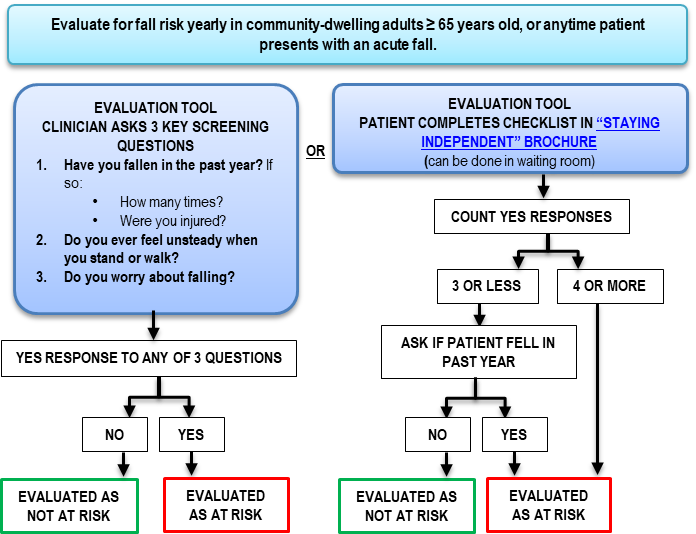The Dementia Fall Risk Diaries
The Dementia Fall Risk Diaries
Blog Article
The smart Trick of Dementia Fall Risk That Nobody is Discussing
Table of ContentsSome Ideas on Dementia Fall Risk You Need To Know5 Simple Techniques For Dementia Fall RiskThe Ultimate Guide To Dementia Fall RiskAll About Dementia Fall Risk
An autumn threat evaluation checks to see exactly how most likely it is that you will certainly drop. The analysis generally includes: This includes a collection of concerns concerning your total health and if you have actually had previous falls or issues with balance, standing, and/or strolling.Interventions are referrals that might decrease your threat of falling. STEADI consists of 3 steps: you for your danger of falling for your risk factors that can be boosted to attempt to avoid drops (for example, balance troubles, damaged vision) to reduce your threat of dropping by using reliable techniques (for example, supplying education and resources), you may be asked several inquiries consisting of: Have you fallen in the past year? Are you fretted concerning falling?
You'll rest down once again. Your supplier will examine how lengthy it takes you to do this. If it takes you 12 secs or even more, it might imply you go to greater threat for a fall. This test checks strength and equilibrium. You'll sit in a chair with your arms went across over your upper body.
The placements will certainly obtain tougher as you go. Stand with your feet side-by-side. Move one foot halfway onward, so the instep is touching the huge toe of your various other foot. Move one foot completely in front of the various other, so the toes are touching the heel of your various other foot.
Dementia Fall Risk for Beginners
The majority of falls happen as a result of several contributing factors; consequently, managing the risk of falling begins with recognizing the factors that contribute to fall threat - Dementia Fall Risk. Several of one of the most relevant threat variables include: Background of prior fallsChronic clinical conditionsAcute illnessImpaired stride and equilibrium, lower extremity weaknessCognitive impairmentChanges in visionCertain high-risk drugs and polypharmacyEnvironmental elements can likewise enhance the threat for falls, including: Poor lightingUneven or damaged flooringWet or unsafe floorsMissing or harmed handrails and get hold of barsDamaged or improperly fitted tools, such as beds, mobility devices, or walkersImproper usage of assistive devicesInadequate supervision of individuals staying in the NF, including those that exhibit hostile behaviorsA effective fall risk management program needs a complete medical assessment, with input from all members of the interdisciplinary group

The care strategy ought to additionally consist of interventions that are system-based, such as those that promote a risk-free atmosphere (ideal illumination, hand rails, order bars, etc). The effectiveness of the interventions ought to be evaluated regularly, and the treatment plan changed as essential to mirror changes in the loss threat evaluation. Applying an autumn danger management system making use of evidence-based finest method can minimize the frequency of drops in the NF, while limiting the potential for fall-related injuries.
The Ultimate Guide To Dementia Fall Risk
The AGS/BGS standard recommends screening all adults aged 65 years and older for loss danger annually. This screening consists of asking individuals whether they have dropped 2 or more times in the past year or sought clinical attention for a fall, or, if they have actually not fallen, whether they feel unstable when walking.
Individuals who have dropped when without injury ought to have their balance and stride evaluated; those with stride or balance problems ought to obtain added analysis. A background of 1 autumn without injury and without stride or balance troubles does not necessitate additional assessment past ongoing annual fall threat testing. Dementia Fall Risk. A fall risk analysis is called for as component of the Welcome to Medicare exam

Fascination About Dementia Fall Risk
Documenting a falls background is just one of the quality signs for loss prevention and administration. A vital component of threat assessment is a medication review. A number of classes of medicines boost autumn threat (Table 2). copyright medicines specifically are independent predictors of drops. These medications have a tendency to be sedating, modify the sensorium, and harm balance and stride.
Postural hypotension can often be alleviated by reducing the dosage of blood pressurelowering medicines and/or quiting drugs that have orthostatic hypotension as an adverse effects. Usage of above-the-knee support hose and copulating the head of the bed boosted might likewise minimize postural decreases in blood pressure. The recommended components of a fall-focused physical exam are displayed in Box 1.

A TUG time greater than or equal to 12 secs recommends high fall threat. The 30-Second Chair Stand examination examines reduced extremity stamina and balance. Being unable to stand up from a chair of knee height without making use of one's arms suggests enhanced fall danger. The 4-Stage Balance examination analyzes fixed equilibrium continue reading this by having the patient stand in 4 settings, each gradually more difficult.
Report this page